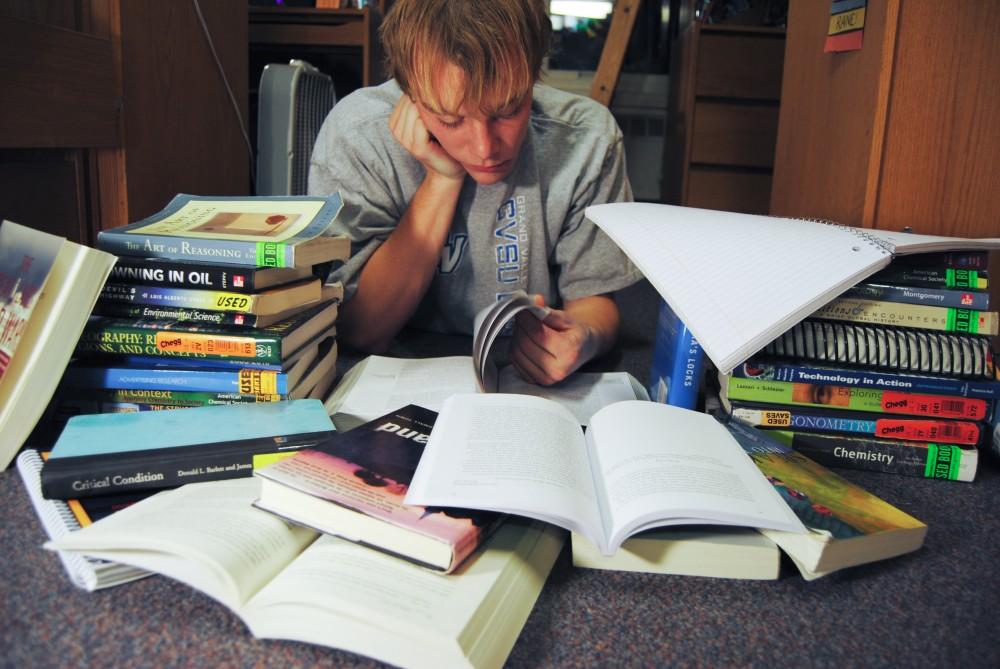Stressed Students

Students can easily become overwhelmed by the amount of work school entails
Feb 14, 2011
“As I interact with friends and colleagues around the country at other institutions, that’s not unique to Grand Valley,” said Bart Merkle, dean of students at Grand Valley State University. “I think we’re seeing this across the country at colleges and universities,”
In a comprehensive survey titled “The American Freshman: National Norms Fall 2010,” more than 200,000 students were surveyed over the span of 25 years, and the number of freshmen who said their emotional health was “below” average has been rising steadily.
Only 52 percent of students surveyed rated themselves as “above average” in emotional health, a significant drop from the 64 percent that answered the same when the survey began in 1985.
Although economic hardships may be a key contributor, Merkle noted a different reason for the increasingly shaky transition between high school and college for these emotionally tanked freshman.
“I think it’s a little bit more related to the fact that we have a lot of students at younger ages who are getting treatment for emotional issues,” he said. “Very often a student has had some challenges prior to coming to college, so when they go away to school they often are now responsible for their own medication – to take their medication and to do it regularly, where when they were in high school often parents were kind of managing medication regimes. Students don’t always do that as well as their parents do.”
Merkle said the advancement in the ability to recognize, diagnose and treat some of the more common anxiety and depression kinds of illnesses is not where the problem lies. The trouble, he said, is when a student who has been taking medication that allows them to function and cope with relative ease begins to drift away from taking the medication, resulting in the resurfacing of the problems that drove them to the medication to begin with.
“We’re not a residential treatment facility,” he said. “We’re an educational institution. We have psychologists and staff in our counseling center that do a lot of work with students to help them try to manage their lives in a positive way, but in the end, the university can’t make students take medication if they
Students are adults and they make choices.”
The GVSU Counseling Center’s Halim Naeem said the Center has seen a spike in crisis activity in recent years, and he thinks less preparation in leaving the home coupled with shifts in the economy and culture are the cause.
“I would say a general impatience about things and having things so fast, like Facebook and Twitter and the emotional attachment that’s put on these instant and impulsive type of things and technologies,” Naeem said. “People take certain things to heart with texts and posts where we didn’t quite have a lot of this stuff 20 years ago.”
The mindset of students, Merkle agreed, has changed with developments in technology and increased expectation of immediate award, calling it an “I want what I want when I want it” mindset that translates over to class work and grades.
Managing that mindset, Naeem said, starts with self-control.
“Coming into college can be very chaotic, things are kind of wide open,” he said. “And having a structure and having some time of regiment that promotes some type of self-development and self-growth can really help students to a much more psychologically stable, emotionally stable and even physically stable type of environment.”
But even Merkle cannot ignore the impact a slumping economy is having on students’ emotional health. With four out of his five kids going through or having gone through the college process, he says he has lived the challenges facing students and their families.
“I think clearly, college costs have continued to go up and it is a challenge for every family to try to educate students,” he said.
Chair of the economics department, Paul Isely, said students should realize that there is still a value for a degree even in today’s frail economic state.
“Some degrees have higher paybacks and there are some jobs that have done well not requiring a degree, but overall the return on investment for a college education is positive,” he said. “Meaning that the higher wages cover the cost of school via the wage differential between high school and college jobs on average.”
The unemployment rate for people with a college education is well below the unemployment rate in general, Isely added, with 4.2 percent unemployment for those with a bachelor’s degree or higher, compared to a 9 percent overall.
“The high unemployment seems to be mostly people that lost jobs early in the recession and their skills no longer align with jobs available,” he said. “The number of people that have been unemployed for short periods of time is basically back to normal – this means new hires or people that have just lost their jobs are finding jobs almost as quickly as prior to the recession.”
And although West Michigan is improving, Isely said the large pool of job-hunters still requires graduates to be pro active in the job search as well as multi-talented.
Iseley suggests using websites like www.bls.gvo/oco to see what types of jobs are growing the fastest and then to match up the skill desired by firms hiring with an individuals own educational goals.
When all is said and done, professionals agree that balance is key.
“What I’m doing with a number of clients is schedules, structure and more weekly regiments in terms of times to study, times to work out, times to go to class, time to have free time,” Naeem said. “Something a little more balanced.”

























